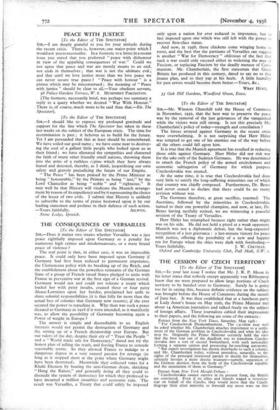[To the Editor of THE SPECTATOR] SIR, —Mr. Winston Churchill told
the House of Commons in November; 1932, that the best way to preserve the peace was by the removal of the just grievances of the vanquished while the victors were still strong. Is not this precisely Mr. Chamberlain's policy of today—strength and conciliation ?
The forces arrayed _against Germany in the recent crisis were overwhelming. It is not surprising that Herr Hitler was tempted to get one of his enemies out of the way before all the others could fall upon him.
It is true that the Munich agreement has resulted in reducing those odds against Germany. _ Herr Hitler did not risk war for the sake only of the Sudeten Germans. He was determined to smash the French policy of the armed encirclement and economic subjugation of Germany for which purpose Czechoslovakia was created. _ At the same time, it is true that Czechoslovakia had done very little to satisfy the long-suffering minorities out of which that country was chiefly composed. Furthermore, Dr. Benes had never ceased to declare that there could be no treaty revision without war.
The Germans therefore, at great sacrifice, rearmed. The Austrians, followed by the minorities in Czechoslovakia, turned to their one powerful champion, and now, at last, Dr. Benes having tactfully retired, we are witnessing a peaceful revision of the Treaty of Versailles.
Herr Hitler has triumphed because right rather than might was on his side. He did not hold a pistol at a weak opponent. Munich was not a diplomatic defeat, but the long-expected recognition of a just grievance : a last-minute victory for peace with justice, offering the possibility of a new and happier era for Europe when the skies were dark with foreboding.—










































 Previous page
Previous page